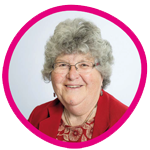Keep us consistently updated and let us know about changes in advance
Foreword
Tasha

Member of SiLSiP (Say it Loud Say it Proud)
Bracknell Forest Children in Care Council
I’ve been a member of SiLSiP (Say it Loud Say it Proud) Bracknell Forest Children in Care council since I came into care about 7 years ago. Members of SiLSiP and I get involved in different projects to have our say and help make care better. Being involved in projects supported by this strategy gives us a voice to make changes and help others who may not be heard. I feel like care has improved over the years, but I’m really excited to see how this Corporate Parenting strategy will help bring all areas of the council together to help children in future get the best care and support to help them achieve what they want to in their life.
Mark Wheeler

Member of Meet and Eat and Care Leaver Champion, Corporate Parenting Advocacy Panel
As a care experienced young person and the care leaver representative on the Corporate Parenting Panel, I feel that this strategy is a vital part of Bracknell Forest Councils corporate parenting commitment to young people. Children and young people’s views were influential during the development of the strategy and will also be important further ahead within the period of this strategy. Throughout this strategy there have been pledges produced and these are at the forefront of the strategy. I hope with this strategy, working across all areas of the council, these pledges will shine through to help everyone work together to achieve the best outcomes for care experienced young people.
Councillor Mary Temperton

Leader of the council
As Leader of Bracknell Forest Council, I am proud to present our Corporate Parenting strategy, which reflects our commitment to making sure of the best possible outcomes for our children and young people in care and leaving care. This strategy outlines how we, as corporate parents, will work together to provide the support, opportunities, and care that every child and young person deserves. We are dedicated to listening to their voices, understanding their needs, and making decisions that put their wellbeing and future first. By working collaboratively across the council, and with external partners, we can put every child at the core of everything we do.
What is a corporate parent?
The Children and Social Work Act 2017 says that when a child or young person comes into care of the local authority, or is under 25 and was looked-after by the authority for at least 13 weeks after their 14th birthday, the authority becomes their corporate parent. This means that they should:
- act in the best interests and promote the physical and mental wellbeing of those children and young people
- encourage them to express their views, wishes and feelings, and take them into account, while promoting high aspirations and trying to secure the best outcomes for them
- make sure they have access to services
- make sure that they are safe, with stable home lives, relationships and education or work
- prepare them for adulthood and independent living
Universal responsibility
This responsibility is for:
- all councillors and elected members
- all partners, including health, schools, police and so on
This is the minimum standard which requires all elected members, council officers and partner agencies to understand the needs of looked after children. Members and officers should make sure of the best possible care for children looked after and care leavers.
Targeted responsibility
This responsibility is for:
- Corporate Parenting Advocacy Panel
- Overview and Scrutiny Panel
- Corporate Management Team
- Children’s Social Care managers and professionals
Elected members who are part of the Corporate Parenting Advocacy Panel and other corporate parenting forums will be aware of relevant issues and expectations regarding services to children looked after and care leavers.
Specialist responsibility
This responsibility is for:
- Cabinet Member for Children and Young People
- Executive Director: People
Senior roles will provide systematic leadership across the authority in relation to the needs of, and services to, children looked after and care leavers.
As corporate parents, its every councillor’s responsibility to make sure that the council is meeting these duties towards children in care and care leavers. Children can be in care in a range of different settings, with the authority acting as a corporate parent to all of them. This includes foster care, children’s homes, secure children’s homes and kinship care.
Every councillor and officer within a council has a responsibility to act for those children and young people as a parent would for their own child. Lead members, those on the Corporate Parenting Advocacy Panel and overview and scrutiny committees will have particular responsibilities but for all councillors, this is where your role as the eyes and ears of the community is particularly important.
Local Government Association
Children looked after and care leavers

The term ‘children looked after’ (CLA) refers to all children under the age of 18 being looked after by the local authority. It includes both those subject to a care order under section 31 of the Children Act 1989 and those looked after by a voluntary agreement with their parents under section 20 of that Act.
The local authority are required to improve the life chance of all children where their parents are unable to do so, for a variety of reasons. These include situations where the parents are abusive or cannot provide adequate care for them, or where there is no parent or relative available, such as asylum-seeking children or those whose parents have died. Once they become looked after, children may be placed by the local authority with family members, foster carers or in a residential children’s home.
A care leaver is a young person aged 16 to 25 who has been looked after since they were 14 years old or were in care on or after their 16th birthday. Care leaver support should be provided up to the age of 21 (or up to the age of 25 in some circumstances) or until they have completed their education if this is longer.
Care experienced as a protected characteristic
Children looked after and care leavers face significant barriers that impact them throughout their lives. Despite the resilience of many care experienced children and young people, society too often does not take their needs into account. CLA and care leavers often face discrimination and stigma across housing, health, education, relationships, employment and the criminal justice system.
The Independent Review of Children’s Social Care, published in May 2022, proposed the recommendation that “government should make care experience a protected characteristic” and “new legislation should be passed which broadens corporate parenting responsibilities across a wider set of public bodies and organisations”.
As corporate parents, we have a collective responsibility for providing the best possible care and safeguarding for every child in our care. The Public Sector Equality Duty requires public bodies, such as councils, to eliminate unlawful discrimination, harassment, and victimisation of people with protected characteristics.
Therefore, at Bracknell Forest, we recognise our duty to put the needs of CLA and care leavers at the heart of decision-making through co-production and collaboration. Decisions are assessed through the Equality Impact Assessment and as part of our corporate parenting responsibility, we consider every CLA and care leaver alongside those who formally share a protected characteristic.
Corporate parenting as part of the ‘golden thread’
The council plan sets out the overall ambition for what we want to achieve for and with residents, businesses and partners. It sets out what we prioritise as a council in the borough across the 4-year period. It is a key document for the council and the plan is delivered through annual service plans, the council’s budget and specific strategies.
The actions outlined in the annual directorate service plans, will be monitored against this strategy to determine areas where council-wide corporate parenting is evident and can be measured within this strategy’s action plan.
Embedding a culture of corporate parenting across the council
To make sure the council functions as a true corporate parent, it is vital to foster a culture where everyone understands their collective responsibility for the welfare of children and young people in care. Corporate parenting extends beyond Children’s Social Care, involving all service areas, including external partners such as health.
The council’s leadership team must actively champion corporate parenting by embedding it in decision-making. This will be evident in actions such as consideration of how corporate parenting is being integrated across services to improve outcomes for children in care.
Training is key to this cultural shift. All council staff, from frontline officers to senior leadership teams, are offered training to understand the principles of corporate parenting and how their roles contribute to supporting care experienced children. When an officer starts at the council, they are given a ‘corporate parenting pack’ to help them understand their responsibility within the council.
The council’s value of being an ‘always learning’ organisation demonstrates where active involvement of children and young people is essential. Regular consultation and feedback mechanisms are in place to make sure your voices are heard, and that policies and services reflect your needs where possible. This makes sure that every child is supported and empowered to achieve their full potential.
Council-wide corporate parenting
Council-wide collaboration is a fundamental element of the council’s corporate parenting responsibilities, making sure that children and young people in care receive comprehensive and coordinated support. Recognising that no single service area can meet all the needs of children looked after and care leavers, this strategy outlines the valuable partnerships between corporate, health, education, housing and social care services in addition to other key stakeholders. This collaboration helps to address the complex needs of children looked after and care leavers, offering a holistic and well-rounded approach to support.

By promoting unified planning, decision-making and service delivery, council-wide corporate parenting allows professionals from different services to share expertise and resources. This collaborative approach breaks down silos, making sure that care is not isolated but integrated, addressing both immediate and long-term outcomes for children. The aim is to encompass your physical, emotional, educational and social wellbeing to make sure you receive the most appropriate and tailored support.
‘Whole council approach’ is reflected in the Care Leaver Covenant as the strategic idea that responsibility for being a corporate parent sits across the whole council. Bracknell Forest Council’s partnership with the covenant reflects our commitment to making sure care leavers are provided with the best opportunities council-wide, from effective service offerings to job opportunities.
The Corporate Parenting Advocacy Panel plays a pivotal role in facilitating this collaboration making sure that professions from external partners, members and officers have a space to regularly communicate performance reporting and use their mechanisms to make sure of continuous improvement.
As part of our council-wide corporate parenting approach, we have developed a new training offer delivered by care experienced children for officers across the council. This initiative is designed to provide officers with a deeper, more personal understanding of the challenges and experiences faced by children in care. By incorporating the voices of those with lived experience, we make sure that all professionals (extended beyond social care) are equipped with knowledge, empathy and skills needed to provide the best possible support. This approach fosters a more inclusive and responsive system, making sure the needs of children in care are met with compassion and understanding at every level of engagement.
Furthermore, council-wide corporate parenting is critical towards supporting you as you transition out of care. By coordinating with housing services, local businesses, and other external partners, we make sure that you have the necessary resources to transition into adulthood successfully. Through these partnerships, young people receive support in securing housing, finding employment and accessing support services to make sure you are well-prepared for independent living.
Ultimately, the success of our corporate parenting duty depends on the commitment of all stakeholders to work together towards a shared goal; that every in our care has the support they need.
Panels
Corporate Parenting Advocacy Panel
As a corporate parent, the council is committed to making sure that every child and young person in its care, and those leaving care, receive the best possible support. The Corporate Parenting Advocacy Panel (CPAP) plays a vital role in overseeing this commitment and promoting positive outcomes.
Key responsibilities
Leadership and strategy:
- provide leadership across the council to improve the health, wellbeing and life chances of children in care and care leavers
- set strategic priorities for services supporting children in care and care leavers
Quality of services:
- make sure that services are high-quality, integrated and focused on the individual needs of each child or young person in care
Listen to young people:
- promote the voice of children and young people by listening to their views and making sure their opinions inform decisions
Accountability and monitoring:
- regularly monitor progress against priorities and hold all partners to account for their role in delivering services
- track performance through key indicators, making sure commitments in this strategy are met
CPAP has designated champions for each subject area, making sure of focused and expert input on key topics at every meeting. These champions will influence discussions, bringing valuable insights and advocating for continuous improvement in their respective areas. Corporate parenting champions foster a dynamic collaboration between members and officers, creating a synergy where both parties work closely together, using their authority and networks to influence progress. This collaborative approach enhances decision-making and drives the agenda leading to high quality outcomes for children looked after and care leavers.
Corporate parenting champions cover the following topics:
- education and training
- employment, apprenticeships and business
- housing
- quality assurance
- participation
- health and wellbeing
- finance
- equality, equity, diversity and inclusion
- transition to adulthood
CPAP will deliver on a new reporting mechanism from the launch of this strategy whereby an annual report will be taken to full council as part of the Leader’s update. This will make sure of consistent accountability of the strategy’s action plan.
Say it Loud, Say it Proud (SiLSiP)

SiLSiP is our children in care council, run by children looked after or those leaving care. The group meets monthly to discuss key issues related to their experiences and to drive positive changes, making sure the voices of children and young people are heard.
Joining SiLSiP offers young people the opportunity to:
- share their views and have their voices heard
- influence decision-makers and key individuals within the council
- develop valuable new skills
- connect with other young people have similar experiences of being in care
One of the significant contributions of SiLSiP is the collaborative creation of a document which outlines young people’s perspectives on what is important during social worker visits. This document, 'What can I expect from my social worker', provides essential guidance for both children in care and professionals working with them.
| Attachment | Size |
|---|---|
| 342 KB |
SiLSiP have also produced numerous, informative videos about their experiences SiLSiP resources. As part of their offer, the group runs ‘Do You Know?’ training sessions for council staff. These sessions help officers understand the lived experiences of children looked after, helping us to enhance the quality of support provided to young people.
SiLSiP plays a critical role in shaping the care experience and making sure that young people’s voices are central to the development of services that directly affect them.
What are we being told?
Listening and talking to children looked after is at the core of what we do. They know what works well, what is less successful and what needs to change. Nationally, children looked after are giving the message that the following issues are important:
- my views and feelings are being ignored in the decisions being made about me
- being moved or knowing where I am going to live
- getting the support I need to continue my education
- getting the financial support I am entitled to
- getting better contact with my family and friends
- having a safe place to live
Locally, there are a variety of established means of hearing the voice of children looked after and care leavers. A primary one is SiLSiP. SiLSiP host an annual event (The Bracknell Big Ballot) to allow children looked after to vote for the issues which they consider most important for SiLSiP to monitor and work on each year. Care Leavers Council also host frequent ‘meet and eat’ events to give care leavers a chance to come together and discuss their experience with personal advisers and managers.
Children looked after and care leavers have been consulted on the pledges committed to in this strategy. It is what you have suggested that we promise.
Don’t put pressure on us to be our best but give us opportunities to succeed
Teach us how to be financially stable like budgeting for bills
Acknowledge that we aren’t your own children and we have different experiences
Teach us how to make healthy meals
Work with us on how to be safe
Help stop bullying about being fostered in school
Pledges
We promise to do our best to:
- support you in the same way as if you were our own child but acknowledge your individual circumstances
- listen to your wishes and work on finding the best solution
- consistently update you in a way that you prefer
- work with schools and colleges and educate your local community to reduce the possibility of being bullied
- work with you, so you know how to be safe
- support you to get the education and training you need to help you to develop your skills and achieve your goals in life
- offer opportunities for you to manage your physical and mental wellbeing
- encourage and empower you to feel confident in who you are, making sure you have the resources and care needed to thrive as your authentic self
- provide you with a safe and secure place to live
- commit to engaging with every child in our care, including those living out of borough

What does that look like?
When we say “we promise to do our best to”, we mean that we are fully committed to providing the highest standard of care that we can, with the resources we have, while being accountable for the promises we make and continuously striving to meet your needs and aspirations in a way that upholds your rights and well-being.
Pledge 1: Support you in the same way as if you were our own child but acknowledge your individual circumstance
Develop personalised care plans that take into account unique backgrounds and health, educational and emotional needs.
We are offering trauma informed and corporate parenting awareness training to all officers to make sure they are informed and able to support you and your journey in the best way.
Foster carers are trained and supported on how to support specific needs, such as trauma-informed care, cultural needs and mental health challenges.
Pledge 2: Listen to your wishes and work on finding the best solution
Offer regular forums such as the Big Ballot or ‘meet and eats’ to share your views, making sure opinions are heard.
You are actively involved in your care reviews.
Corporate Parenting Advocacy Panel holds a standing agenda item for care leaver updates from a care-experienced representative.
Mind of My Own is an app that enables you to capture your views around social care to help us improve.
Social workers will explain their capacity and schedule to you so you can agree on an expectation that works for both of your needs.
Pledge 3: Consistently update you in a way that you prefer
Social workers offer communication options like text, WhatsApp, email and establish what works best for you.
For children with complex communication needs, key workers will seek specialist support to make sure that children are given every opportunity to communicate in a way that they prefer.
Make sure key workers regularly check in with you to offer updates about your care or any changes you should be aware of.
We will provide clear and regular updates during transitions.
Pledge 4: Work with schools and colleges and educate your local community to reduce the possibility of being bullied
Collaborate with schools to implement antibullying policies.
Trauma informed training offered to school staff to support you in the best way.
Make sure the council actively participates, and involves your views, in campaigns to raise awareness about the experiences of children in care.
Peer support is offered to foster positive relationships amongst your network.
Provide you with sufficient resources so you know how to report bullying, making sure of immediate intervention and follow-up support.
Pledge 5: Work with you, so you know how to be safe
Provide you with sufficient resources to inform you on key topics including online safety, personal boundaries and what to do in emergencies.
Conduct regular safety reviews to make sure your living situation, school and activities are free from harm.
Pledge 6: Support you to get the education and training you need to help you to develop your skills and achieve your goals in life
All EHCPs reflect preparing for adulthood from year 9 onwards to highlight your aspirations and allow you to receive the support you need.
Provide access to mentoring to support career readiness, skills development programmes (such as CV writing and interview practice).
We will work with training providers to make sure care leavers have access to vocational training opportunities.
Elevate is available to care leavers for referral to support you to find career advice.
The Tuition Hub (run by Elevate) offers maths, English and functional skills classes for care leavers not in employment, education or training.
Pledge 7: Offer opportunities for you to manage your physical and mental wellbeing
We work collaboratively with you to improve services based on your feedback.
You are entitled to pre-paid prescriptions if you are a care leaver and not already entitled, no matter where you live.
NHS Universal Families support those that are care experienced into education, training or employment within the health service.
NHS Frimley ICB have funded a pilot scheme to make sure that Unaccompanied Asylum-Seeking Children have appropriate health screening in the context of their country of origin and lived experience, to support positive health outcomes into adulthood.
We offer the Children in Care CAMHS model, working to extend this to care leavers.
We are committed to working with adult social care to support your transition into adulthood support.
Pledge 8: Encourage and empower you to feel confident in who you are, making sure you have the resources and care needed to thrive as your authentic self
You are encouraged to explore hobbies, talents and interests that contribute to your sense of self-worth and individuality.
We will make sure you have access to appropriate support services and resources that empower your identity.
Your social worker and personal adviser will make sure you have access to documentation relevant to your life journey and will be there to answer any questions you may have in regards to this.
We promise to take an interest in the personal things you share with us.
Pledge 9: Provide you with a safe and secure place to live
We work with housing services and residential providers to make sure that you have access to secure and appropriate living where you are supported to become as independent as
possible.
Housing services offer training to support you in preparing to maintain and sustaining your tenancy.
We support you to have a voice where possible, about decisions regarding where you live both in care and when you turn 18.
We are committed to putting in measures of prevention to make sure that housing services do not find you ‘Intentionally Homeless’ against the Housing Act 1996.
We undertake a collaborative approach to make sure that your personal advisors have adequate knowledge of housing support to offer you the best possible advice.
Pledge 10: Engaging with every child in our care, including those living out of borough
We will be there to support you through remote and in-person check-ins from your social worker.
We will proactively engage with all children and young people to inform our participation offer, so you can inform the support you receive.
Develop and uphold successful relationships with out of borough placement authorities and agencies to make sure of smooth transitions and consistent care for children placed out of borough through our participation offer.
Sufficiency plans
The local authority has a duty to make sure, as far as is reasonably possible, sufficient accommodation is available locally to meet the needs of children looked after and care leavers. This can be directly provided, or commissioned provision. The council will regularly review our position on this, and report how we intend to meet the sufficiency duty.
In-house fostering
Since March 2021 to March 2023 there has been a 24% reduction in children placed with in-house foster carers. There had been an increase of CLA fostered with relatives or friends with a notable increase in March 2023, this had doubled from March 2022.
Bracknell Forest is taking the lead in the Local Authority South East (LASE) fostering hub, which will help improve the rate of approve fostering households and the retention of existing foster carers.
For more information on Bracknell Forest’s data on children looked after and care leavers, see our sufficiency plan 2024.
Performance reporting
The national picture
Nationally the number of children looked after stands at 83,840 as of March 2023 (Children's Commissioner) which is an 2% increase on the previous year and continuing the rise seen in recent years:
- the largest age group (39%) are aged 10 to 15 years
- 23% are aged 16 years and over 19% are aged 5 to 9 years
- 13% are aged 1 to 4 years
- 6% are aged under 1 year
House prices in the UK have risen by 2.8% between August 2023 to April 2024 and the national living wage has risen by 6.7% during the same period. The outcomes for children and young people in care are poor, with research indicating that this group is over represented amongst the homeless population, prison population, are more likely to be offending, experience drug and alcohol misuse and have poor mental health. Disabled children and children from ethnic minorities experience further disadvantage.
However, despite the complex needs these children and young people have, many can and do make a great success of their lives, with the right support and care.
The local picture
Bracknell Forest is in Berkshire, South-East England. It is a unitary authority, having the powers of a non-metropolitan county and district council combined. The administrative area of Bracknell Forest covers approximately 110 square kilometres and encounters large rural areas which can make finding placements within the authority problematic.
The average property prices as of March 2023 within this ward are £389,000 which is 23% higher than the national average. Bracknell Forest has a population of 124,608 and has increased by 10% in the last 10 years. Approximately 27,846 children and young people (aged under 18) live in Bracknell Forest and make up 22% of the total population.
Bracknell Forest has no areas in the most deprived 10% in England. The greatest levels of deprivation within the area are in Wildridings and Central. These neighbourhoods are amongst the 30% most deprived LOSAs in the country. 10.7% of Bracknell Forest’s under 16s lived in relative low-income families in 2020 to 2021. This is over 2,700 children and continues to increase.
At any one time, there are around 924 children (as of 31 March 2024) in need of social care support from Bracknell Forest Council. Among this number, two groups of children require particularly intensive support:
- 119 children were subject to child protection plans in 2023 to 2024, having been assessed by the local authority and other multi-agency partners as being at risk of significant harm.
- 140 children were looked after by the local authority as of 31 March 2024, and were in the care of the council either voluntarily (with the agreement of their parents), or by orders of the court.
The number of children referred to social services had reduced by 15% from 1,780 in 2023 to 1,511 in 2024.
Care leavers are defined under 3 main cohorts:
- Eligible child is a child aged 16 and 17 who has been looked after for at least 13 weeks since the age of 14 and who is still being looked after.
- Relevant child is a child aged 16 and 17 who has been looked after for at least 13 weeks since the age of 14 and who has left care.
- Former relevant child is a young person over 18 who was previously ‘eligible’ or ‘relevant’. Council’s support this group until aged 21, or longer if they are in education or training.
There has been an increase of 24% of eligible care leavers and 18% of former relevant care leavers between March 2023 and March 2024. The number of relevant care leavers remains low over the years. The majority of care leavers remain looked after until they are 18. This could be related to the increased number of CLA. At the end of March 2024 there were 62 eligible, 0 relevant and 92 former relevant young people.
Reporting mechanisms
The progress of this strategy will be monitored by the Corporate Parenting Advocacy Panel and will be reported to the Overview and Scrutiny Committee for Children, Young People and Learning.
Actions will also form the delivery of directorate service plans from 2025 onwards to make sure regular service reporting and progress tracking takes place. This aligns the work of the corporate parenting strategy with the council’s strategic goals.
Action plan
The pledges made by the council for children looked after and care leavers have been developed into an action plan that outlines clear objectives, measurable outcomes, and specific actions to be monitored over the 3-year period of this strategy.
This action plan incorporates operational, detailed commitments made by service areas and partners across the council, making sure of a coordinated, council-wide approach to meeting the promised for these children and young people. These contributions from various departments and partners have directly influenced and shaped the action plan, aligning their efforts with the overarching pledges to deliver high quality obligation to our corporate parenting duty.
The data monitored from the action plan will be incorporated into the Children and Young People’s Partnership Plan, to make sure of consistent reporting.
